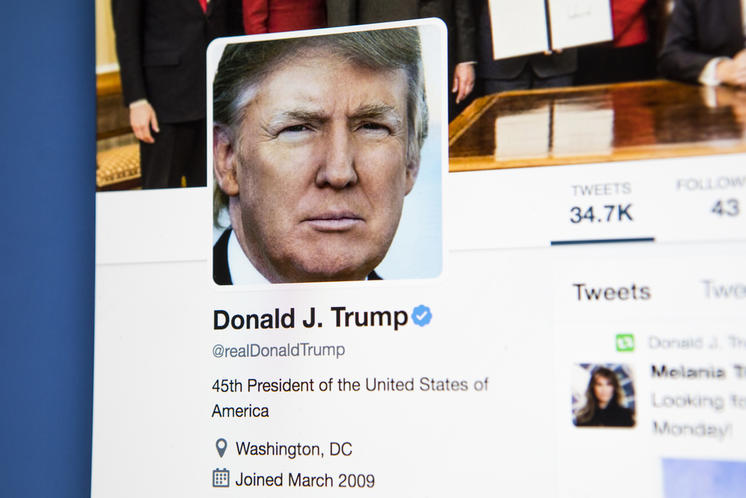Weekly Thoughts by Mirabaud Securities - 10 May 2019



Wall Street plunged Monday morning after crucial trade talks with China appeared to collapse, renewing fears of an all-out trade war between the world's two largest economies. The Dow Jones Industrial Average fell by 450 points at the opening bell, with the S&P 500 down 1.55 percent and the Nasdaq sliding 2.2 percent.
The market turmoil began Sunday after President Donald Trump slammed China in a surprise early morning tweet that said he would slap tariffs on almost all imported goods starting Friday. The largest sectoral decrease was due to sectors “China sensitive”: Materials, technology and industrials.
In Europe, it was the SMI and the Dax that suffered less (thanks to better economic statistics) and the FTSE MIB lagged behind (the political turmoil weighed heavily on the index). Finally, in Asia, we saw a big consolidation in China over the week. In Japan, the Nikkei lost more than 3.5% (in Dollar).

It’s quite unusual but over the week the Dollar got almost lower against G10 currency members. The Japanese Yen was the only gainer (in Dollar). The Japanese currency, which tends to benefit during geopolitical or financial crises rises to five-week high against the Dollar. The British Pound was the biggest looser of the week, ahead of the Swedish Krona. In emerging markets (still in dollars), the Thai Baht and the South African Rand were the only gainers. We saw some significant decreases on the Turkish Lira, the Colombian Peso and the Argentinian Peso.
The Semiconductor Industry Association (SIA) published a new report Monday that shows worldwide sales of semiconductors totalled $96.8 billion during 1Q19, a 15.5% plunge over 4Q18 and a 13% drop YoY. Global sales for March 2019 were $32.3 billion, a 2% decline from February and 13% drop YoY. Regionally, sales increased in March on a MoM basis in China (1.3%) and Europe (0.60%), but declined in the Asia Pacific (-1.9%), Japan (-4.5%), and the Americas (-6.7%). On a YoY basis in March, sales plunged in Europe (-6.8%), Asia Pacific (-9.3%), China (-9.4%), Japan (-11.1%), and the Americas (-26.6%). SOX index has soared nearly 31% this year, doubling the performance of the overall market even with a massive decline in sales, both domestically (-23% YoY) to the lowest level in two years and globally as well (-11%).
The global semiconductor industry is deteriorating, the probability of a 2H19 rebound in sales is now questionable.

According to a play-by-play published by Reuters Wednesday morning, it appears President Trump finally lost his patience with Beijing when they returned a draft trade deal with strikeouts eliminating virtually all of the major concessions made during the past few weeks. Though reports about Beijing's unwillingness to compromise had begun appearing with more regularity during the preceding week, according to Reuters, it appears Beijing was deliberately trying to provoke President Trump. And if this was indeed China's goal, it appears it succeeded.
Top trade adviser Robert Lighthizer and Treasury Secretary Steven Mnuchin said earlier this week that Trump's tariff threats were prompted by Beijing reneging on its promises. But they refused to disclose any details. It now appears that Beijing has gone back on practically all of the concessions it had made during the negotiations, including deals on currency stabilization, enforcement and market access for cloud-computing firms, to name a few. Nobody knows how this will end but a new tariff delay Is the most likely…

Chairman and CEO Warren Buffett is arguably one of the best-known investors in the world. His company, Berkshire Hathaway held this week-end his annual shareholder meeting in Nebraska. In advance of the Saturday event, Buffett turned heads late last week when he revealed in an interview that Berkshire Hathaway had purchased Amazon.com shares for the first time. This announcement led to the inevitable questions on Saturday about whether Berkshire was abandoning its value-investing roots with its purchase of Amazon.
As he suggested, Buffett didn't initiate the purchase. It came from one of his top managers, Todd Combs or Ted Weschler, who handle independent portfolios with Buffett's blessing. Warren Buffett pointed out that a host of financial metrics undergo review before Berkshire invests in any company, including sales, margin, and tangible assets, as well as the company's cash and debt positions. This isn't the first time Buffett has answered questions about Amazon. Back in 2017, when asked about why he hadn't understood Amazon's potential, Buffett said it was "stupidity."
Semiconductors in the spotlight / Automotive: The worst may not be behind us / China has lost its hand / US-China trade dispute: What are the scenarios? Fake meat: Here we are
Please feel free to ask for more information if interested.
“(US) Level of confidence fade” (WEAKNESSES). Consumer confidence surged in February and rose for the first time in four months, a sign that Americans have regained optimism after the recovery in the U.S. stock market, the end of the government shutdown and diminished worries about recession.
“Hard and Soft Brexit” (Opportunities & Threats) is on the cliff this week after the Brexit was postponed to 31 October. There is still a risk, however, that the House of Commons will approve the withdrawal agreement before May 22nd.
“Short relief in commercial tensions” (Opportunities). These next few days should give us much more insight into the future of US-China trade relations.
SWOT stands for Strengths, Weaknesses, Opportunities and Threats, the French equivalent of FFOM analysis (Forces, Faiblesses, Opportunités et Menaces). While SWOT analysis can be used to develop a company's marketing strategy and evaluate the success of a project (by studying data sets such as company's strengths and weaknesses, but also competition or potential markets), I decided several years ago to adapt it as a way to analyse financial markets. SWOT analysis allows a general development of markets by crossing two types of data: internal and external. The internal information taken into account will be the strengths and weaknesses of the market. The external data will focus on threats and opportunities in the vicinity. Finally, and most interestingly, there is a table that will evolve according to current events, which will allow it to reflect the underlying trend in the financial markets on a weekly basis.
This publication is prepared by Mirabaud. It is not intended to be distributed, disseminated, published or used in any jurisdiction where such distribution, dissemination, publication or use would be prohibited. It is not intended for people or entities to whom it would be illegal to send such publication.
Read more
Author
Continue to
